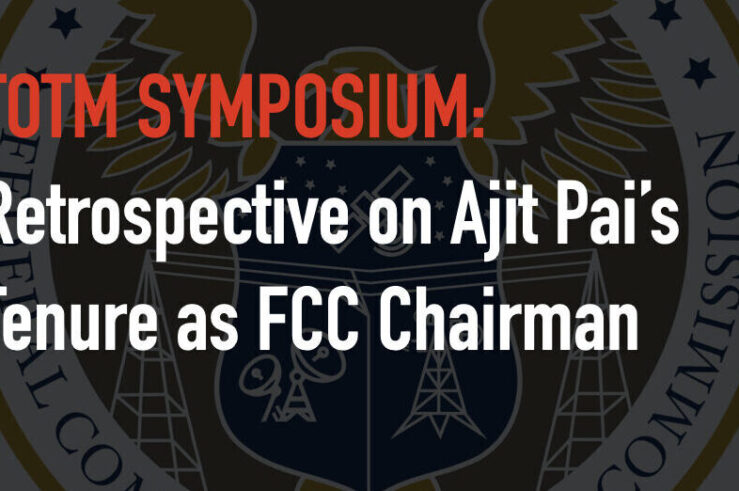Welcome to the TOTM Symposium on FTC UMC Rulemaking
There is widespread interest in the potential tools that the Biden administration’s Federal Trade Commission (FTC) may use to address a range of competition-related and competition-adjacent concerns. A focal point for this interest is the potential that the FTC may use its broad authority to regulate unfair methods of competition (UMC) under Section 5 of ... Welcome to the TOTM Symposium on FTC UMC Rulemaking
Call for Submissions on FTC UMC Rulemaking Authority
The Limits of FTC UMC Rulemaking Symposium There is widespread interest in the potential tools that the Biden administration FTC may use to address a range of competition-related and competition-adjacent concerns. Among other issues, there have been indications that the FTC may use its broad UMC authority under Section 5 of the FTC Act to ... Call for Submissions on FTC UMC Rulemaking Authority
Pai’s Legacy of Progress in Closing the Rural Digital Divide
I was having a conversation recently with a fellow denizen of rural America, discussing how to create opportunities for academics studying the digital divide to get on-the-ground experience with the realities of rural telecommunications. He recounted a story from a telecom policy event in Washington, D.C., from not long ago. The story featured a couple ... Pai’s Legacy of Progress in Closing the Rural Digital Divide
The Capitalist’s Lived Experience
Speaking about his new book in a ProMarket interview, David Dayen inadvertently captures what is perhaps the essential disconnect between antitrust reformers (populists, neo-Brandeisians, hipsters, whatever you may call them) and those of us who are more comfortable with the antitrust status quo (whatever you may call us). He says: “The antitrust doctrine that we’ve ... The Capitalist’s Lived Experience
The Not Neutrality of Tech Reporting: Discussing the Economics of Lifting Data Caps During a Stay-at-home Crisis
[TOTM: The following is part of a blog series by TOTM guests and authors on the law, economics, and policy of the ongoing COVID-19 pandemic. The entire series of posts is available here. This post is authored by Justin “Gus” Hurwitz, (Associate Professor of Law & Co-director, Space, Cyber, and Telecom Law Program, University of ... The Not Neutrality of Tech Reporting: Discussing the Economics of Lifting Data Caps During a Stay-at-home Crisis
The Third Circuit’s Oberdorf v. Amazon opinion offers a good approach to reining in the worst abuses of Section 230
[Note: A group of 50 academics and 27 organizations, including both myself and ICLE, recently released a statement of principles for lawmakers to consider in discussions of Section 230.] In a remarkable ruling issued earlier this month, the Third Circuit Court of Appeals held in Oberdorf v. Amazon that, under Pennsylvania products liability law, Amazon ... The Third Circuit’s Oberdorf v. Amazon opinion offers a good approach to reining in the worst abuses of Section 230
Reports of the press’s death are greatly … understated
More than a century of bad news Bill Gates recently tweeted the image below, commenting that he is “always amazed by the disconnect between what we see in the news and the reality of the world around us.” Of course, this chart and Gates’s observation are nothing new – there has long been an accuracy ... Reports of the press’s death are greatly … understated
We need leaders that embrace complexity, not dumb it down
In a recent NY Times opinion piece, Tim Wu, like Elizabeth Holmes, lionizes Steve Jobs. Like Jobs with the iPod and iPhone, and Holmes with the Theranos Edison machine, Wu tells us we must simplify the public’s experience of complex policy into a simple box with an intuitive interface. In this spirit he argues that ... We need leaders that embrace complexity, not dumb it down
The Mozilla oral arguments and the ongoing hell of the “net neutrality” debate
In the opening seconds of what was surely one of the worst oral arguments in a high-profile case that I have ever heard, Pantelis Michalopoulos, arguing for petitioners against the FCC’s 2018 Restoring Internet Freedom Order (RIFO) expertly captured both why the side he was representing should lose and the overall absurdity of the entire ... The Mozilla oral arguments and the ongoing hell of the “net neutrality” debate
Telemarketing, Technology, and Why the Telephone Sucks (and how to fix it)
It is a truth universally acknowledged that unwanted telephone calls are among the most reviled annoyances known to man. But this does not mean that laws intended to prohibit these calls are themselves necessarily good. Indeed, in one sense we know intuitively that they are not good. These laws have proven wholly ineffective at curtailing ... Telemarketing, Technology, and Why the Telephone Sucks (and how to fix it)
Putting Politics over Policy at the FCC
FCC Commissioner Rosenworcel penned an article this week on the doublespeak coming out of the current administration with respect to trade and telecom policy. On one hand, she argues, the administration has proclaimed 5G to be an essential part of our future commercial and defense interests. But, she tells us, the administration has, on the ... Putting Politics over Policy at the FCC
For LabMD, the Devil Is in the Not-So-Well Specified Details
The Eleventh Circuit’s LabMD opinion came out last week and has been something of a rorschach test for those of us who study consumer protection law. Neil Chilson found the result to be a disturbing sign of slippage in Congress’s command that the FTC refrain from basing enforcement on “public policy.” Berin Szóka, on the ... For LabMD, the Devil Is in the Not-So-Well Specified Details







